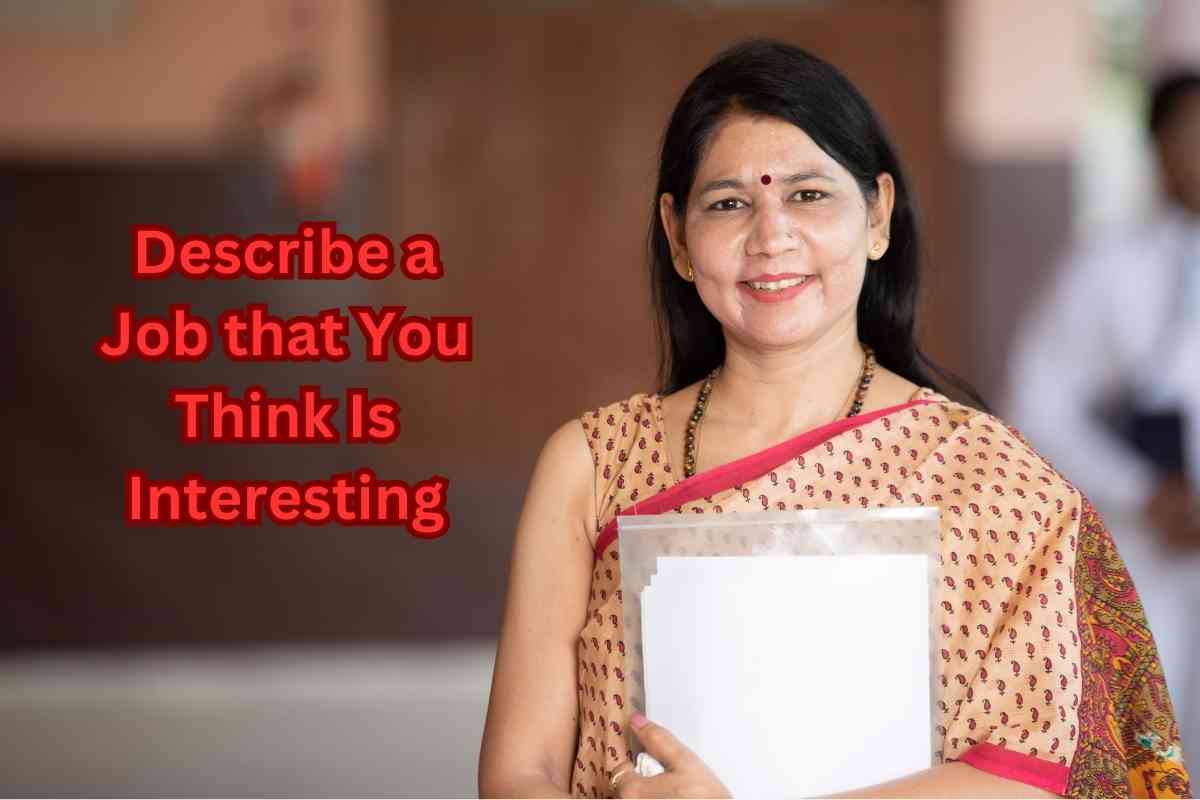Describe a Job that You Think Is Interesting. You should say:-
- What is it?
- Why do you think it is interesting?
- How do you know it?
- What necessary skills does it need?
Sample 1:- Describe a Job that You Think Is Interesting
The realm of professions is vast and varied, yet the role of a doctor, in my perspective, stands out as particularly intriguing. At its core, a doctor is a medical professional trained to diagnose and treat illnesses, ensuring the well-being of patients.
Doctors’ profound impact on human lives piques my interest in this profession. They treat physical ailments and often provide emotional solace during trying times. Every day presents a new challenge, a mystery to solve, which makes the profession not just about routine check-ups but about critical thinking and continuous learning. Moreover, the breadth of specializations, from neurology to paediatrics, signifies the vast knowledge base and expertise the field encompasses.
My admiration for doctors stems from personal experiences. As a child, I was often under the weather, and my paediatrician’s kindness and proficiency left an indelible mark. Later in life, while conducting IELTS training sessions for medical professionals aiming to work abroad, I delved deeper into their rigorous training and their day-to-day experiences, further augmenting my respect for the profession.
Becoming a doctor necessitates a plethora of skills. Beyond the foundational medical knowledge, which is imperative, doctors need excellent interpersonal skills, given the sensitive nature of their interactions with patients. Patience is paramount, as is the ability to work under pressure, especially in life-threatening scenarios. Moreover, doctors must commit to lifelong learning staying abreast of medical advancements and research. Ethical considerations and empathy also play a crucial role in ensuring holistic care.
In conclusion, the profession of a doctor is a confluence of science, empathy, and continuous learning, making it one of the most revered and intriguing jobs in the world.
Sample 2:- Describe a Job that You Think Is Interesting
Among the myriad of professions in the digital era, one that strikes me as particularly compelling is the role of an SEO Expert. Search Engine Optimization, or SEO for short, refers to the practice of enhancing a website’s visibility on search engines like Google.
What fascinates me about this role is its dynamic nature. The digital landscape is ever-evolving; search engines continuously update their algorithms. Consequently, an SEO expert is always on their toes, deciphering these changes and strategizing accordingly. It’s not just about stuffing keywords but understanding intent, optimizing for voice search, and ensuring a seamless mobile experience.
My introduction to the intricacies of SEO came about a few years ago when I embarked on creating a website for IELTS resources. I soon realized that having quality content was only half the battle; making it discoverable was equally crucial. This led me to collaborate with an SEO expert, and through our interactions, I gained insights into their world of meta-tags, backlinks, and organic traffic.
To excel as an SEO expert, a unique skill set is required. Firstly, a robust analytical ability is paramount. One needs to dissect vast amounts of data to discern patterns and insights. Technical skills, understanding the backend of websites and the nuances of server responses play a crucial role. Additionally, an SEO expert should be innately curious, always staying updated with the latest digital trends. Excellent communication skills are also vital, as they often need to convey complex concepts to clients or other team members who might not be well-versed in the technicalities.
An SEO Expert operates at the intersection of technology, analytics, and marketing, making it an interesting and quintessential job in the modern digital-first world.
Sample 3:- Describe a Job that You Think Is Interesting
When pondering over various professions, the role of a teacher always stands out to me as especially captivating. Teaching is about imparting knowledge, moulding young minds, and creating a foundation upon which societies can prosper.
The allure of this profession lies in its transformative power. While on the surface, it might seem a straightforward task – delivering lessons and assessing students – there’s a profound depth to it. Teachers don’t merely relay information; they inspire, challenge, and foster a love for learning. Every day is different, and every student brings unique challenges and potential. I’ve observed several colleagues from diverse teaching backgrounds. Their stories, experiences, and their palpable impact on their students have enriched my understanding of this noble profession.
My initial glimpse into the teaching world was through my own educators. However, it was only when I stepped into their shoes that I truly grasped the complexities and joys of this role. I was fortunate to witness the profound difference a dedicated teacher can make in a student’s life.
To be an effective teacher requires a melange of skills. Patience, undoubtedly, is at the forefront. Understanding that every student learns at their own pace is essential. Strong communication skills are crucial, ensuring concepts are conveyed clearly. Moreover, a teacher must be adaptable and ready to change their teaching methods if something isn’t working. Beyond these, a genuine passion for the subject and an insatiable desire to make a difference are the intangible qualities that elevate a good teacher to a great one.
In essence, teaching isn’t just a job; it’s a vocation, a calling that has the potential to shape the future one student at a time.
Sample 4:- Describe a Job that You Think Is Interesting
A job that has always intrigued me, both for its blend of science and art, is that of a horticulturist. This profession revolves around cultivating and caring for plants, encompassing everything from fruits and vegetables to ornamental plants and flowers.
What fascinates me most about horticulture is the combination of precision and creativity it demands. On one hand, it’s a science requiring knowledge of soil types, plant physiology, and climate conditions. Conversely, a clear touch of artistry is involved when you see a beautifully landscaped garden or a thriving orchard. Each plant, with its unique requirements and characteristics, is like a piece of a larger puzzle, making the job perpetually fresh and challenging. I’ve had students who pursued studies in horticulture. Their narratives and essays have nurtured and sustained my interest in this field.
My knowledge of this job isn’t firsthand; rather, it’s accumulated from literature, interactions, and personal observations. I’ve often frequented botanical gardens and farms, where I’ve had the chance to converse with professionals and witness their work up close.
To excel as a horticulturist, one needs a plethora of skills. Foremost is an understanding of botany, which forms the foundation of their work. Practical skills, like pruning, grafting, and soil testing, are equally vital. Additionally, given that plants are living entities, patience and perseverance become paramount. One must also possess observational acumen to detect diseases or pests early. On top of these technical skills, a genuine love for plants and an aesthetic sense are the cherries on top that can truly distinguish an adept horticulturist.
In a world increasingly detached from nature, the role of a horticulturist serves as a beautiful bridge, reconnecting us to the earth and its myriad wonders.
Sample 5:- Describe a Job that You Think Is Interesting
I’ve encountered many professions, each with its unique allure. However, one job that I find particularly captivating is that of an urban planner. This role focuses on the organized development and management of cities, towns, and other built environments.
I find urban planning so intriguing because of its sheer impact and complexity. Urban planners are the masterminds behind the design of our living spaces. They ensure efficient land use, create sustainable infrastructure, and craft spaces that foster community and cultural growth. It’s a profession that stands at the crossroads of architecture, sociology, environmental science, and public administration. While teaching, I’ve encountered essays and discussions on urban planning, which have deepened my understanding and appreciation. Moreover, attending city council meetings and reading articles has further broadened my perspective.
Though not firsthand, my insights about urban planning stem from a blend of academic sources, conversations with professionals in the field, and observations from travels to various cities around the world. Witnessing the tangible differences in planning strategies among cities is a testament to the role’s significance.
Being an effective urban planner requires an eclectic skill set. Technical knowledge in fields like geography and architecture is paramount. They also need a keen analytical mind to assess data and foresee future needs. Furthermore, excellent communication and negotiation skills are indispensable as their decisions influence public life. An understanding of environmental sustainability, combined with an appreciation for heritage and culture, helps in creating spaces that resonate with residents. Additionally, a dose of creativity aids in envisioning innovative solutions to urban challenges.
Urban planners shape the future, moulding cities into sustainable, functional, and vibrant habitats. While often behind the scenes, their role holds profound implications for urban populations’ health, happiness, and growth.


Leave a Reply